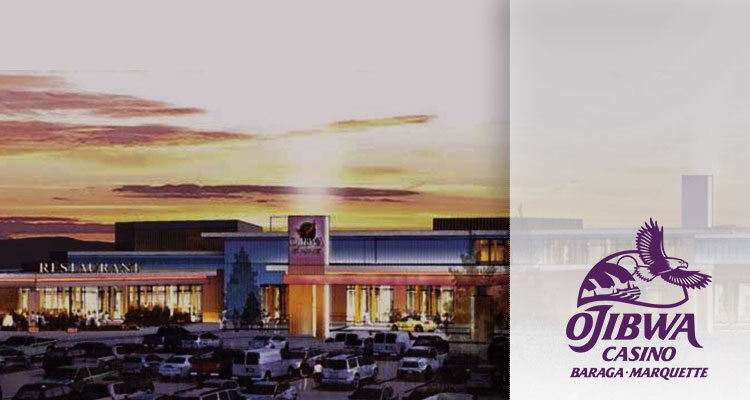After years of delays, the Keweenaw Bay Indian Community’s (KBIC) $34 million casino expansion project in Michigan’s Upper Peninsula is apparently now on schedule for a December unveiling.
A groundbreaking ceremony for the Marquette Ojibwa Casino expansion and improvement project was held in early December 2016. Since that time the casino has encountered some costly issues resulting in the expected September 2018 completion date being pushed back to what was thought would be 2020.
“The project is on target to be completed within budget”
According to local newspaper, The Mining Journal, the casino’s General Manager, Larry Denomie, said in a recent email…
“The project is moving along very well and we are actually slated to open most of the new facility in December of this year. The only item that will open a bit later is the new restaurant that will feature menu items developed by Dave Anderson, founder of Famous Dave’s BBQ.”

What’s included and what’s not:
Located on a rural stretch of highway on M28 in Chocolay Township, the current phase of the casino project was originally slated to include a much-needed hotel, however, that part of the initial plan was reportedly not feasible.
What is reportedly included in Phase I of the project is a new 1,200-seat event center, which will be the first part of the revamped casino to be completed, a 400-seat convention space, and 500 slot machines, up from its current 280-plus.
Denomie, reportedly said that they…
…”are getting calls regularly from large groups interested in renting the center to host their events. We are finalizing plans internally and will have contact information out so others seeking to host their events have a point of contact to work with.”
Public water system:
Already finished is a new public water system, complete with a 186-foot-tall retention tower with a 75,000-gallon capacity, which KBIC 2 percent gaming funds financed, with Chocolay Township as a conduit, according to the news agency.
“The new public water system is complete and providing water to the current casino as well as the KBIC Housing residents behind the casino,” said Denomie. “The system is now available to Chocolay Township as well to use as a firefighting resource in the area. The tower itself was constructed to provide the ability for companies to put antennas/towers on top of it. We recently had agreements approved with NMU and 906 Technologies to be the first ones to take advantage of the opportunity.”
KBIC will be reimbursed via annual payments of $62,000 taken from the township’s two percent gaming revenue payments over the next decade.
Required by Michigan tribe’s gaming compact with the state, the payments represent two percent of tribal casino’s slot machine revenue and are dispursed twice a year to local municipalities.
MDOT project:
KBIC is also partnered with the Michigan Department of Transportation (MDOT) on a $564.000 reconstruction project of the M-28/Acre Trail intersection, which began on Aug. 19, 2019. Acre Trail Road is the entrance to the casino.

According to MDOT’s August 13 press release…
“Left- and right-turn lanes will be added on M-28 to support the additional traffic and turning movements generated by the expansion. The project also includes concrete curb and gutter, new signs, pavement markings, and centerline rumble strips.”
Expected to be completed on Sept. 27, the project is courtesy of a Transportation Economic Development Fund (TEDF) Category A grant, which was secured to pay for sixty percent of the reconstruction, with MDOT and the KBIC contributing the remaining matching funds.
Denomie said…
“Our role is merely monetary in nature; we are providing matching funds toward the project cost. MDOT will be handling the entire project which will be (a) huge increase in traveling safely through that corridor and the entrance to the casino. We are thankful that MDOT saw the need to move this project forward for the safety of our customers, employees and those traveling through that area.”
Hotel not feasible:
As mentioned above, the initial plan included a much-needed hotel, as the nearest lodging is an approximate five-mile drive on a rural two-lane highway. Currently, the casino’s shuttle bus operates four days a week with the last run at 11:30pm on Wednesdays and Thursdays and 1am on Friday and Saturday.
Commenting on the absent hotel, Denomie said…
“Of course we are disappointed that we weren’t able to get the hotel into Phase I of the project, but with good working relationships with hoteliers in the Marquette area and a robust transportation program, we will make sure our customers are able to safely enjoy the new casino while leaving the driving to get to their hotel in town to us.”
Hedge your bets:
With an anticipated uptick in business, it’s assumed that the casino’s “robust transportation program” is a significant improvement over the existing one.
Denomie added…
“The project is on target to be completed within budget — and I’m hopeful, slightly under budget! The Keweenaw Bay Indian Community will have invested nearly $50 million into the Baraga and Marquette Casinos when all is said and done — a historical and much needed investment. The new Marquette Casino is going to be beautiful and unique to any other casino in the region.”

Area competition:
The Marquette County casino’s nearest competition, Island Resort & Casino, is owned and operated by the Hannahville Indian Community (a band of the Potawatomi Nation) and is located in Harris, just under 80 miles south on US-41.
After recently completing a massive $8 million expansion and renovation project, the property features 326-rooms and suites spread over two towers, a 1,400-seat headline entertainment showroom, 13,000 square feet of flexible meeting space, two 18-hole championship golf courses, a full-service spa and salon, six restaurants and bars, gift shop, 42-site RV Park and approximately 1,204 slot machines, 26 table games including a six-table poker room and more.
Approving referendum:
In August 2016, the KBIC approved renovations for both its Ojibwa Casinos in a referendum authorizing a total of $40 million for the projects with $6.5 million slated for Ojibwa Casino Baraga and $33.5 million for its Chocolay Township casino. Originally opened in 1985, the Baraga casino hosted its grand reopening ceremony on April 27, 2019, with the lion’s share of work going into a state-of-the-art ventilation system.
Other updates feature cosmetic improvements to the interior of the casino, including the restaurant space. The casino reportedly has plans to work on upgrades to its main bar and dated hotel rooms over the next several months.



